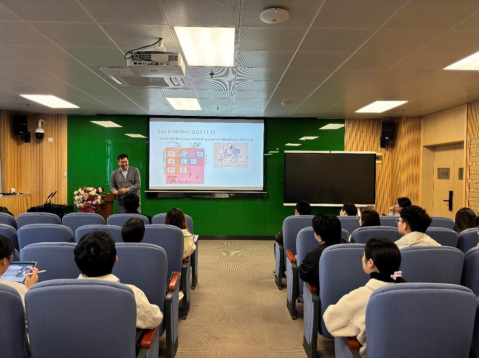On the afternoon of March 7th, Professor Tian Xing, a researcher in neuroscience and cognitive science at New York University(NYU)Shanghai, delivered a lecture titledThe Functions of Motor-Based Prediction and Its (Possible) Relation with Higher-Order Cognition: Attention as an Example at the Schoolof Psychology, Shenzhen University. Professor Tian shared a series of his research findings on thefunctions of motor-based prediction, offering an extended perspective on predictive coding theory beyond sensory-based prediction. He highlighted the potential central role of motor processes in bridging sensory perception and higher-order cognitive functions.

Firstly, Professor Tian focused on the interaction between sensory and motor systems and the neural mechanisms of language processing. He discussed several experimental studies investigating how motor signals at different stages modulate auditory responses during language preparation. Through three EEG experiments, he found that preparation without specific linguistic content suppresses early neural responses to all speech sounds, while preparation with specific linguistic content enhances neural responses to the prepared language. He introduced two types of motor signals: Corollary Discharge (CD) and Efference Copy (EC). They play distinct roles at different stages of language preparation, with CD inhibiting and EC enhancing auditory responses.
Additionally, Professor Tian addressed the computational neural mechanisms underlyingmotor-based prediction. He conducted a series of studies examining the general inhibitory function of CD during the intention-to-speak phase. Through a delayed vocalization paradigm and EEG experiments, he discovered that preparing to speak without knowing the specific content leads CD to inhibit auditory responses to all types of sounds, with a stronger inhibitory effect on human-produced sounds. CD modulates auditory processing by reducing response amplitude and increasing temporal variance. Besides, Professor Tian explored the distortion of auditory perception in schizophrenia patients under multi-scale prediction. Experiments revealed that patients with auditory hallucinations exhibit heightened sensitivity to auditory stimuli under long-term regularity prediction but reduced sensitivity under short-term repetitive prediction. This suggests that schizophrenia patients exhibit differences in predictive processing across different time scales, which affects auditory perception.
Finally, based on existing evidence, Professor Tian proposed a preliminary framework formotor-based predictive codingand discussed its potential relationship with certain higher-order cognitive functions. In the end, He outlined promising directions for future research in this field.